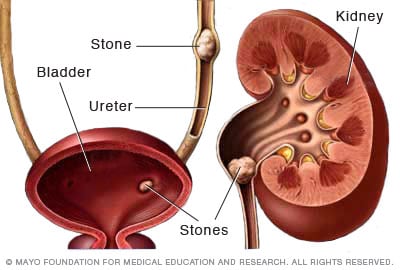Navigating the Symptoms of Kidney Stones vs UTI: A Thorough Comparison
Navigating the Symptoms of Kidney Stones vs UTI: A Thorough Comparison
Blog Article
Checking Out the Manifestations and Causes of Kidney Stones in Contrast to Urinary System Infections: A Thorough Overview
The exploration of kidney stones and urinary tract infections (UTIs) reveals a complicated interaction of signs and underlying reasons that necessitate mindful examination. While both conditions can lead to hematuria, they present distinct medical features and occur from different etiological elements. Comprehending the nuances of each condition is essential for effective diagnosis and management. What are the key distinctions in their signs and symptoms, and just how might these educate therapy methods? The solution to these concerns may provide essential understandings right into the prevention and care of these usual urological concerns.
Summary of Kidney Stones
Kidney stones, also called renal calculi, kind when specific substances in the pee crystallize and aggregate, leading to the growth of difficult down payments within the kidneys. These stones can differ in size, varying from a grain of sand to a golf sphere, and can be made up of different materials, one of the most common being calcium oxalate, uric acid, struvite, and cystine. The development of kidney rocks is influenced by numerous elements, consisting of dietary behaviors, fluid consumption, and genetic tendency.
Symptoms of kidney stones might include extreme discomfort in the back or side, blood in the urine, nausea or vomiting, and frequent peeing, particularly as the stone relocates through the urinary system. Medical diagnosis usually entails imaging research studies such as ultrasound or CT scans, along with urinalysis to identify the stone's make-up.
Therapy options vary based upon the dimension and type of stone, along with the severity of signs (Kidney Stones vs UTI). Tiny rocks may pass normally with increased fluid intake, while larger rocks might call for clinical interventions such as lithotripsy or surgical removal. Comprehending the pathophysiology and threat factors associated with kidney stones is necessary for reliable avoidance and management
Summary of Urinary Tract Infections
Urinary tract infections (UTIs) prevail bacterial infections that impact any type of component of the urinary system, consisting of the kidneys, ureters, bladder, and urethra. They mostly take place when microorganisms, often from the gastrointestinal tract, enter the urinary system, resulting in swelling and infection. UTIs are classified right into two primary types: uncomplicated and complex. Uncomplicated UTIs typically occur in healthy and balanced people with typical urinary tracts, while complicated UTIs might emerge in people with underlying conditions, such as architectural problems or jeopardized immune systems.
The prevalence of UTIs is especially higher in females than guys, mainly due to physiological differences, such as a much shorter urethra. Danger factors consist of sex, certain contraceptive approaches, urinary retention, and dehydration. The diagnosis of UTIs is normally confirmed via urine examinations, which may disclose the presence of microorganisms, white blood cells, or red cell.

Signs And Symptoms of Kidney Stones
The discomfort connected with kidney stones can materialize in numerous means, often leading individuals to seek medical interest. Among one of the most typical signs and symptoms is extreme discomfort, typically localized in the lower back or side, which may radiate to the abdomen or groin. This pain, frequently referred to as sharp or cramping, can happen unexpectedly and might change in strength.
Furthermore, individuals may experience hematuria, or blood in the urine, which can range from microscopic quantities to noticeable staining. This signs and symptom might be gone along with by moved here modifications in urinary practices, such as enhanced frequency or urgency, as well as pain during urination. Nausea and throwing up are additionally common, usually arising from the body's reaction to intense discomfort.
In many cases, people may experience fever and cools, particularly if a second infection develops as a result of the obstruction brought on by the rocks. In general, the mix of extreme pain, hematuria, modified urinary system patterns, and intestinal signs and symptoms can provide considerable understanding right into the presence of kidney stones, necessitating prompt medical analysis and intervention. Understanding these signs is vital for timely diagnosis and efficient monitoring of the condition.
Symptoms of Urinary System Infections
Infections within the urinary system system often present a series of distinct signs and symptoms that can significantly impact life. The most typical signs consist of a visit this site relentless impulse to pee, usually accompanied by a burning sensation during peeing, referred to as dysuria. People might additionally experience raised regularity of peeing, generating percentages of urine each time.
Other noteworthy symptoms include cloudy or foul-smelling pee, which might suggest the existence of bacteria or pus. Sometimes, pee might show up red or pink due to the presence of blood, a problem referred to as hematuria. Furthermore, individuals might experience pelvic pain or pressure, which can even more exacerbate the sensation of necessity.
Systemic signs may additionally materialize, such as fever, cools, and tiredness, particularly if the infection has risen to the kidneys. It is necessary to acknowledge these symptoms early, as unattended urinary system tract infections can bring about a lot more severe difficulties. Kidney Stones vs UTI. Trigger medical focus is encouraged when these symptoms are observed, enabling suitable analysis assessment and therapy to ease discomfort and protect against additional wellness problems
Reasons For Each Condition
Regularly, kidney stones and urinary system tract infections develop from distinct yet often overlapping reasons that can affect people differently. Kidney rocks typically develop due to metabolic aspects, nutritional choices, and hereditary proneness. Enhanced degrees of calcium, oxalate, or uric acid in the pee can lead to stone development. Dehydration, insufficient fluid consumption, and high-sodium diet regimens can exacerbate these conditions, advertising formation within the urinary tract.

Recognizing these distinctive reasons is essential for prevention and treatment. Kidney Stones vs UTI. While lifestyle modifications may mitigate the threat of kidney rocks, suitable health and prompt therapy of urinary tract infections are vital for decreasing their recurrence and connected problems
Conclusion
In summary, kidney stones and urinary system tract infections existing distinct signs and underlying causes. Kidney stones are characterized by severe discomfort and metabolic factors, while urinary system infections primarily include microbial infections leading to urinary system necessity and pain.
The expedition of kidney rocks and urinary system infections (UTIs) discloses an intricate interaction of symptoms and underlying reasons that call for careful examination.Urinary tract infections (UTIs) are common bacterial infections that influence any type of part of the urinary system, including the kidneys, ureters, bladder, and urethra.Often, kidney more information rocks and urinary system tract infections occur from distinct yet often overlapping causes that can impact people differently.In recap, kidney rocks and urinary tract infections present distinct signs and symptoms and underlying causes. Kidney rocks are defined by extreme discomfort and metabolic aspects, while urinary system system infections mainly include bacterial infections leading to urinary necessity and discomfort.
Report this page